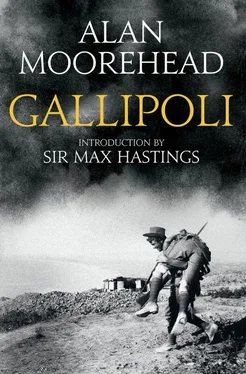Churchill himself with his wife came down to Charing Cross to see the party off, and there was some last minute conversation on the subject of Hamilton’s reports from the front. They would all have to go directly to Kitchener, Hamilton said; to address Churchill separately at the Admiralty would be disloyal. With that he was off. As the train drew out Hamilton said to Captain Aspinall, the young officer who was to plan the operations, ‘This is going to be an unlucky show. I kissed my wife through her veil.’ Four days later the party was at the Dardanelles.
They were just in time. Next day, March 18, Hamilton watched the assault on the Narrows from the decks of the Phaeton.
So now at midnight they were all gathered in the arena: the Turks and the Germans at the Narrows preparing to make a desperate stand, the British and French sailors with their battered but still powerful fleet, and the new Allied Commander-in-Chief who had arrived without an army and without a plan.
Having satisfied himself that both the Ocean and the Irresistible were safe from the Turks at the bottom of the sea, Keyes on the night of March 18 went directly in the Jed to the Queen Elizabeth to see de Robeck. He was astonished to find the Admiral much upset. He was sure, de Robeck said, that because of his losses he would be dismissed from the command on the following day. Keyes answered with some spirit that de Robeck had judged the situation quite wrongly: Churchill would not be discouraged. He would send reinforcements at once and back them up in every way. Apart from the 639 men drowned in the Bouvet , the casualties had been amazingly small: not seventy men in the entire Fleet. All three lost battleships were old vessels due for scrap, and even if the Gaulois and the Inflexible were withdrawn for repairs the great power of the Fleet was substantially intact.
For a time the two officers discussed the problem of the mines, and it was agreed that they should immediately set about organizing a new force to deal with them. The civilian crews of the trawlers would be sent home, and volunteers from the lost battleships would take their place. Destroyers would be equipped with sweeping apparatus, and at the next attempt an attack would be finally driven home.
On this encouraging note the Admiral and his chief-of-staff finally went to their cabins for a few hours’ rest.
Keyes rose next morning, March 19, and having shaved, as was his custom, with a copy of Kipling’s ‘If’ propped up before him, went out to survey the condition of the Fleet, which had spent the night sheltering about Tenedos. It was clear that a day or two must elapse before the attack could be resumed — the wind was again rising to a gale and there was much to be done in organizing the new minesweeping force — but everywhere the captains and the crews were eager to renew the fight.
In the course of the morning a message arrived from the Admiralty condoling with de Robeck over his setback but urging him to press on with the attack.
His losses were to be made good by four more battleships — the Queen, Implacable, London and Prince of Wales —which would sail at once. In addition the French Ministry of Marine was replacing the Bouvet with the Henri IV .
The damage to the French squadron had been severe: Gaulois had been forced to ground herself on Rabbit Island to the north of Tenedos, and the Suffren was leaking from the effects of a plunging shell. The Gaulois , however, was soon pumped out and refloated, and with the Inflexible and the Suffren she went off to Malta for repairs. Meanwhile the organization of the new minesweeping force began. One hundred and fifteen men from the trawler crews were sent home and there was an overwhelming response from the crews of the Ocean and the Irresistible for volunteers to replace them. Kites, wire mesh, and other tackle were ordered from Malta, and at Tenedos Greek fishermen were engaged to help the British crews in equipping the destroyers as minesweepers. All day in heavy seas this work was pressed forward, and on March 20 de Robeck was able to report to the Admiralty that fifty British and twelve French minesweepers, all manned by volunteers, would soon be available. Steel nets would be laid across the straits to deal with floating mines when the attack was renewed. ‘It is hoped,’ he added, ‘to be in a position to commence operations in three or four days.’
Now too an efficient squadron of aircraft under the command of Air Commodore Samson began to arrive. With this the Navy hoped greatly to improve their spotting of the enemy guns.
De Robeck also wrote to Hamilton, who had gone to Lemnos to inspect the 2,000 marines and the 4,000 Australian and New Zealand soldiers who had already arrived there. He urged Hamilton not to take these troops back to Egypt for re-grouping as he proposed to do, since it might create a bad impression in the Balkans just at the moment when the Navy was about to resume its attack. ‘We are all getting ready for another go,’ he said, ‘and not in the least beaten or down-hearted.’
Hamilton did not share this confidence. He had been deeply moved by what he had seen of the battle on March 18, and perhaps he was affected by the sight of the damaged Inflexible creeping back to Tenedos. Perhaps he was influenced by Birdwood, who from the beginning had never believed that the Fleet could do the job alone. Other considerations — even a simple chivalrous desire to help the Navy — may have weighed with him; but at all events he sent the following message to Kitchener on March 19:
‘I am most reluctantly driven to the conclusion that the straits are not likely to be forced by battleships, as at one time seemed probable, and that, if my troops are to take part, it will not take the subsidiary form anticipated. The Army’s part will be more than mere landing parties to destroy forts; it must be a deliberate and prepared military operation, carried out at full strength, so as to open a passage for the Navy.’
Kitchener had replied with surprising energy: ‘You know my view, that the Dardanelles must be forced, and that if large military operations on the Gallipoli peninsula by your troops are necessary to clear the way, those operations must be undertaken, after careful consideration of the local defences, and must be carried through.’
This then was the situation on March 21—a Naval Command that believes that the Fleet can still get through alone, and an Army Command convinced that it cannot.
The following morning, March 22, de Robeck decided to take the Queen Elizabeth over to Lemnos for a conference with Hamilton. There is something of a mystery about this meeting, for none of the subsequent accounts of what took place are in agreement with each other. Keyes was occupied with the arrangements for the new naval attack and was not present, but he assures us that he believed that nothing more than future military movements were to be discussed. Those who assembled in the Queen Elizabeth were Hamilton, Birdwood and Braithwaite from the Army, and De Robeck and Wemyss from the Navy.
Hamilton’s version is as follows: ‘The moment he sat down de Robeck told us that he was now quite clear he could not get through without the help of all my troops . Before ever we went on board, Braithwaite, Birdwood and I agreed that, whatever we landsmen might think, we must leave the seamen to settle their own job, saying nothing for or against the land operations or amphibious operations until the sailors themselves turned to us and said that they had abandoned the idea of forcing the straits by naval operations alone. They have done so. The fat (that is us) is fairly in the fire.
Читать дальше












